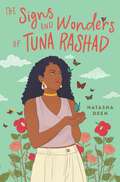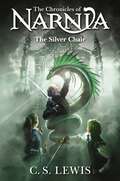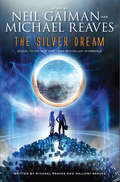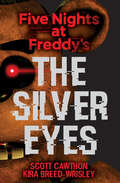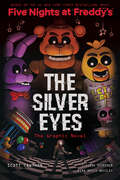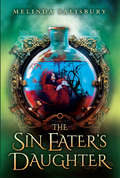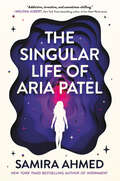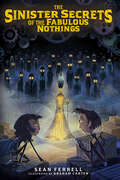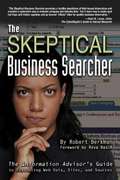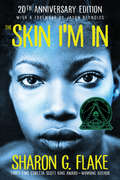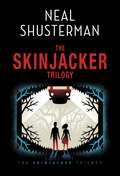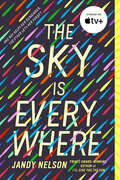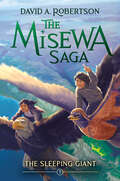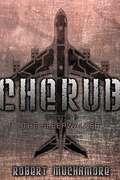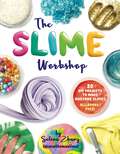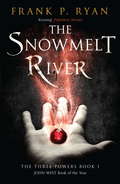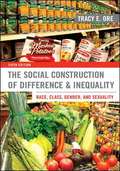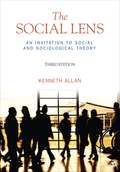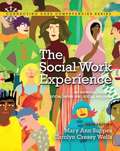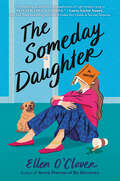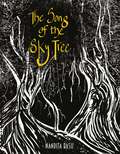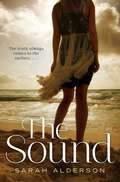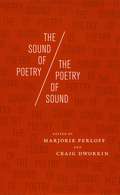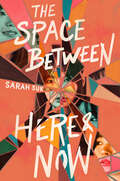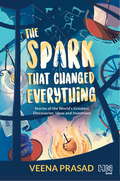- Table View
- List View
The Signs and Wonders of Tuna Rashad
by Natasha DeenAn Ontario Library Association&’s Forest of Reading White Pine Reading List Pick! An Ontario Library Association Best Bets!From award-winning, #OwnVoices author Natasha Deen comes a new funny, honest, YA novel following one girl as she tries to win over her crush before she leaves for college. Let&’s be clear. No matter what her older brother, Robby, says, aspiring screenwriter Tuna Rashad is not &“stupidstitious.&” She is, however, cool with her Caribbean heritage, which means she is always on the lookout for messages from loved ones who have passed on. But ever since Robby became a widower, all he does is hang out at the house, mock Tuna for following in their ancestors&’ traditions, and meddle in her life. Tuna needs to break free from her brother&’s loving but over-bearing ways and get him a life (or at least, get him out of hers!). Based on the signs, her ancestors are on board. They also seem to be on board with helping Tuna win over her crush, Tristan Dangerfield. The only hiccup? She has to do it before leaving for college in the fall. A ticking clock, a grief-stricken brother, and a crush who doesn&’t believe in signs. What could possibly go wrong?
The Silver Chair: The Chronicles of Narnia (Chronicles of Narnia #6)
by C. S. LewisIllustrations in this ebook appear in vibrant full color on a full-color ebook device and in rich black and white on all other devices.Narnia . . . where giants wreak havoc . . . where evil weaves a spell . . . where enchantment rules.Through dangers untold and caverns deep and dark, a noble band of friends is sent to rescue a prince held captive. But their mission to Underland brings them face-to-face with an evil more beautiful and more deadly than they ever expected.The Silver Chair is the sixth book in C. S. Lewis’s The Chronicles of Narnia, a series that has become part of the canon of classic literature, drawing readers of all ages into a magical land with unforgettable characters for over sixty years. This is a complete stand-alone read, but if you want to discover what happens in the final days of Narnia, read The Last Battle, the seventh and concluding book in The Chronicles of Narnia.
The Silver Dream (InterWorld Trilogy #2)
by Neil Gaiman Michael Reaves Mallory ReavesWritten by New York Times bestselling authors Neil Gaiman and Michael Reaves with Mallory Reaves, The Silver Dream is a riveting sequel to InterWorld, full of bravery, loyalty, time and space travel, and the future of a young man who is more powerful than he realizes.Dangerous times lie ahead, and if Joey Harker has any hope of saving InterWorld and the Altiverse, he's going to have to rely on his wits—and, just possibly, on the mysterious Time Agent Acacia Jones.
The Silver Eyes: Five Nights at Freddy’s (Five Nights At Freddy's #Bk.1)
by Kira Breed-Wrisley Scott CawthonFrom the creator of the bestselling horror video game series Five Nights at Freddy's.Ten years after the horrific murders at Freddy Fazbear's Pizza that ripped their town apart, Charlie, whose father owned the restaurant, and her childhood friends reunite on the anniversary of the tragedy and find themselves at the old pizza place which had been locked up and abandoned for years. After they discover a way inside, they realize that things are not as they used to be. The four adult-sized animatronic mascots that once entertained patrons have changed. They now have a dark secret . . . and a murderous agenda.
The Silver Eyes: Five Nights at Freddy’s (Five Nights at Freddy’s Graphic Novels #1)
by Kira Breed-Wrisley Scott CawthonDon't miss the first-ever graphic novel for Five Nights at Freddy's, an adaptation of the #1 New York Times bestselling novel The Silver Eyes illustrated by fan-favorite game artist Claudia Schröder!Ten years after the horrific murders at Freddy Fazbear's Pizza that ripped their town apart, Charlie -- whose father owned the restaurant -- and her childhood friends reunite on the anniversary of the tragedy and find themselves at the old pizza place which had been locked up and abandoned for years. After they discover a way inside, they realize that things are not as they used to be. The four adult-sized animatronic mascots that once entertained patrons have changed. They now have a dark secret... and a murderous agenda.Complete with new information and tense, terrifying illustrations, fans won't want to miss this graphic novel adaptation by Scott Cawthon, Kira Breed-Wrisley, and Claudia Schröder, whose stunning artwork has been featured in the games.
The Sin Eater's Daughter (The\sin Eater's Daughter Novels Ser. #1)
by Melinda SalisburySeventeen-year-old Twylla lives in the castle. But although she's engaged to the prince, Twylla isn't exactly a member of the court. She's the executioner.As the Goddess embodied, Twylla instantly kills anyone she touches. Each month, she's taken to the prison and forced to lay her hands on those accused of treason. No one will ever love a girl with murder in her veins. Even the prince, whose royal blood supposedly makes him immune to Twylla's fatal touch, avoids her company.But then a new guard arrives, a boy whose easy smile belies his deadly swordsmanship. And unlike the others, he's able to look past Twylla's executioner robes and see the girl, not the Goddess. Yet Twylla's been promised to the prince, and knows what happens to people who cross the queen. However, a treasonous secret is the least of Twylla's problems. The queen has a plan to destroy her enemies, a plan that requires a stomach-churning, unthinkable sacrifice. Will Twylla do what it takes to protect her kingdom? Or will she abandon her duty in favor of a doomed love?
The Singular Life of Aria Patel
by Samira AhmedFor fans of You&’ve Reached Sam and See You Yesterday, this captivating and mind-bending second-chance romance explores what it means to love—even across the multiverse.Aria Patel likes stability, certainty, predictability. It&’s why she&’s so into science. It's why she dumped her boyfriend before they went to different colleges because the odds were that something would go wrong, eventually. In a life that&’s already so chaotic, why obsess over complicated relationships and shadowy unknowns when the scientific method gives you direction and a straight path to avoid all the drama. But there&’s no avoiding anything when Aria finds herself suddenly falling through parallel universes and there&’s no formula that can save her. She can&’t explain why she&’s been waking up in a new reality almost every day, or why Rohan, and a poem from her English class, seem to be following her through every new life.As Aria desperately attempts to find a way home, she eventually ends up stuck in a parallel world very similar to her own. She cherishes this new version of her family, and she finds herself unable to deny the yearning she has for Rohan…but it&’s not her life or her Rohan. It belongs to another Aria, another girl, and unless Aria can get back home, she&’ll have taken this happiness away from someone else forever. And she may never find her own. This whirlwind novel from New York Times bestselling author Samira Ahmed will whisk you through worlds unknown, all while putting a multiverse spin on one of BookTok&’s favorite tropes: second chance romance.
The Sinister Secrets of the Fabulous Nothings (The Sinister Secrets #2)
by Sean FerrellTechnological wonders and terrors combine to weave an enchanting tale of finding your own way to belong in the second book in the sweeping Sinister Secrets series.It&’s been thrilling for Noah having the crew of the Abbreviated stuffed in his odd-twisting home. After spending a life being lonely, he finally feels like he has a family. But sailors are meant to be at sea, and now Noah&’s terrified that they&’ll leave him alone once more. He wishes he had the answer to solve this latest predicament.And then the strangest things start happening in the city of Liberty. Under cover of darkness, people&’s greatest wishes start to come true. But what begins as the marvelous realization of dreams soon morphs to ghoulish nightmare . . . and only Noah seems to be able to see the chimeras for what they really are. What&’s more, the infiltration may all be his fault.Now Noah must use his cunning to save Liberty once more. But how do you battle an invisible threat? And what will it cost him? Accompanied by vibrant black and white illustrations, the stunning second book in the Sinister Secrets series reunites old friends for new challenges in a quest brimming with eerie mystery, adventure, and an aching desire to find a space in the world.
The Skeptical Business Searcher: The Information Advisor's Guide to Evaluating Web Data, Sites, and Sources
by Robert BerkmanFocusing on free sources, Berkman (editor of The Information Advisor newsletter) arms business searchers with techniques for finding reliable, accurate company and industry data on the Web. He covers strategies to use before turning to a Web search engine (libraries, pre-screened sources, indexes and directories, weblogs) but also has plenty to say about effective use of search engines themselves. He provides tips on evaluating information for reliability and bias, and discusses big-picture topics like building up personal knowledge and search intuition. Annotation ©2004 Book News, Inc., Portland, OR (booknews.com)
The Skin I'm in
by Sharon FlakeMaleeka suffers every day from the taunts of the other kids in her class. If they're not getting at her about her homemade clothes or her good grades, it's about her dark, black skin.When a new teacher, whose face is blotched with a startling white patch, starts at their school, Maleeka can see there is bound to be trouble for her too. But the new teacher's attitude surprises Maleeka. Miss Saunders loves the skin she's in. Can Maleeka learn to do the same?
The Skinjacker Trilogy: Everlost; Everwild; Everfound (The Skinjacker Trilogy #2)
by Neal ShustermanNot every child who dies goes on to the afterlife. Some are caught halfway between life and death, in a sort of limbo known as Everlost: a shadow of the living world, filled with all the things and places that no longer exist. It’s a magical, yet dangerous place where bands of lost kids run wild and anyone who stands in the same place too long sinks to the center of the Earth. Allie and Nick don't survive the car crash, and end up in Everlost, where coins are more valuable than anyone knows, fortune cookies tell the truth, monsters are real, and the queen of lost souls lives in a once-beloved tower. Nick and Allie have to learn to survive in a world with different rules, and figure out who they can trust--and who they must oppose at all costs. At stake is nothing less than the fate of Everlost and the living world they have left behind. In this gripping trilogy, Neal Shusterman explores questions of life, death, and what just might lie in between.
The Sky Is Everywhere
by Jandy NelsonJandy Nelson's beloved, critically adored debut is now an Apple TV+ and A24 original film starring Jason Segel, Cherry Jones, Grace Kaufman, and Jacques Colimon.&“Both a profound meditation on loss and grieving and an exhilarating and very sexy romance." —NPRAdrift after her sister Bailey&’s sudden death, Lennie finds herself torn between quiet, seductive Toby—Bailey&’s boyfriend who shares Lennie&’s grief—and Joe, the new boy in town who bursts with life and musical genius. Each offers Lennie something she desperately needs. One boy helps her remember. The other lets her forget. And she knows if the two of them collide, her whole world will explode. As much a laugh-out-loud celebration of love as a nuanced and poignant portrait of loss, Lennie&’s struggle to sort her own melody out out the noise around her makes for an always honest, often uproarious, and absolutely unforgettable read.
The Sleeping Giant: The Misewa Saga, Book Five (The Misewa Saga #5)
by David A. RobertsonEli and Morgan embark on a dangerous mission to rescue kidnapped animal beings in this new adventure in the award-winning, Narnia-inspired Indigenous middle-grade fantasy series.Eli, Morgan and Emily embark on their most dangerous mission yet, to save the kidnapped animal beings of Ministik. But before they can reach the heavily guarded Land of the Sleeping Giant, Eli must rally more help, not just from old friends, but from surprising new allies. And he must rely on a new way to travel: on the back of the leader of the Bird Warriors himself, Pip. Together they will journey across the North Country, on a mission to reconnect the Bird Warriors, as well as confront old enemies. But even as he must fight for his life – and the lives of his friends and new family – Eli must also come to terms with his newfound knowledge: What does it mean that he is only part human?
The Sleepwalker: The Sleepwalker (CHERUB #9)
by Robert MuchamoreTeen special agents investigate a deadly plane crash in the ninth book of the CHERUB series, which Rick Riordan says has “plenty of action.”CHERUB agents are highly trained, extremely talented—and all under the age of seventeen. For official purposes, these agents do not exist. They are sent out on missions to spy on terrorists, hack into crucial documents, and gather intel on global threats—all without gadgets or weapons. It is an extremely dangerous job, but these agents have one crucial advantage: Adults never suspect that teens are spying on them. In The Sleepwalker, a commercial plane explodes over the Atlantic Ocean leaving 345 people dead. Crash investigators suspect terrorism, but they aren’t getting anywhere. But when a distressed twelve-year-old calls a police hotline and blames his father for the explosion, James Adams and his sister Lauren are assigned to befriend the boy to find out the shocking truth…
The Slime Workshop: 20 DIY Projects to Make Awesome Slimes—All Borax Free!
by Selina ZhangWhip up 20 borax-free slimes with different textures, cool colors, and special effects from slime enthusiast Selina Zhang (@anathemaslime)! Follow the step-by-step instructions to make slimes to squish, stretch, poke, and play with, including Glow-in-the-Dark Slime, Fluffy Slime, Fishbowl Slime, Unicorn Slime, and more. Along with fun variations, this irresistible full-color guide outlines the essential equipment and ingredients, the science of slime, tips on how to safely make and play with slime, and advice for preserving your creations and troubleshooting common problems.
The Snowmelt River: The Three Powers Book 1
by Frank P. Ryan Ryan, Frank P.Four teenagers are drawn from an Irish mountaintop into an enchanted land and gifted with great powers: but with power comes responsibility, and a vast evil has noticed their arrival . . . On the summit of the fabled mountain Slievenamon in Ireland there is a doorway to an ancient land of terrible power. The gate of Feimhin has lain closed for centuries, the secret of its opening long lost - until four orphans drawn together by Fate pass through the portal and find the enchanted but war-ravaged world of Tír, a strange land peopled by beings of magic. Here death waits at every corner, and they must learn to fight if they are to survive. And they'd better learn quickly, because their enemy, the Tyrant of the Wastelands, is growing in power.'The best fantasy novel I've ever read . . . an epic adventure that just does not stop!' said Glenda A. Bixler on Authorsden!
The Social Construction of Difference and Inequality: Race, Class, Gender, and Sexuality (Sixth Edition)
by Tracy OreThis best-selling anthology surveys how and why the categories of race, class, gender, and sexuality are constructed, maintained, experienced, and transformed. The Social Construction of Difference and Inequality then moves beyond simply discussing various forms of stratification and the impact of these on members of marginalized groups by providing a thorough discussion of how such systems of stratification are formed, perpetuated, and interconnected. Readers are then challenged at the end of each reading with critical thinking questions to relate content to their lives and understand how their own attitudes, actions, and perspectives may serve to perpetuate a stratified system.
The Social Lens: An Invitation to Social and Sociological Theory (Third Edition)
by Kenneth AllanThis fully updated Third Edition of Kenneth Allan’s acclaimed The Social Lens emphasizes the diversity of classical and contemporary theory, critical thinking, and the importance of historical context. Chosen for the diversity of their perspectives and their suitability for introducing students to contemporary social thought, a wide variety of theorists appear in the text with their individual voices vividly intact. The author engages students in the historic and contemporary changes that have spawned diverse social theories and invites them to see theory as an element within a broader range of critical thinking skills that can be applied to current social problems.
The Social Work Experience: An Introduction to Social Work and Social Welfare (Sixth Edition)
by Mary Ann Suppes Carolyn Cressy WellsLearn how social workers use their professional expertise to assist people. This text is part of the Connecting Core Competencies Series. The Social Work Experience: An Introduction to Social Work and Social Welfare introduces students to the profession of social work including eight major fields of practice, and provides in-depth discussion of social welfare policy, its history, contemporary issues, and probable future trends. The book helps students understand how social workers use their professional expertise to assist people in solving a wide variety of problems to improve their lives. There are three major parts: The first part, Social Work and its Context, comprises four chapters which introduce the profession of social work, provide theoretical perspectives underlying generalist practice, investigate the concept of social justice, and explore social welfare policy and its history. The second part, Professional Practice Settings, offers an in-depth discussion of eight fields of practice: family and children's services, mental health, health care, schools, older adult services, criminal justice, and developmental disabilities. The third and final part, A Look to the Future, views the profession through the eyes of futurists and explores the challenges and opportunities that await new social workers. A better teaching and learning experience This program will provide a better teaching and learning experience-for you and your students. Here's how: Personalize Learning - MySearchLab delivers proven results in helping students succeed, provides engaging experiences that personalize learning, and comes from a trusted partner with educational expertise and a deep commitment to helping students and instructors achieve their goals. Improve Critical Thinking - Discussions on values, ethics, human diversity, and generalist social work practice throughout stimulate students to think critically about varying issues. Engage Students - Case studies introduce each chapter and are carefully developed to illustrate the myriad of problems that social workers deal with in daily practice. Explore Current Issues - Includes new content on a variety of issues, including policy diversity, the environment, and much more. Apply CSWE Core Competencies - The text integrates the 2008 CSWE EPAS, with critical thinking questions and practice tests to assess student understanding and development of competency. Support Instructors - An Instructor's Manual and Test Bank, Computerized Test Bank (MyTest), BlackBoard Test Item File, MySearchLab with Pearson eText, and PowerPoint presentations are included in the outstanding supplements package. Note: MySearchLab does not come automatically packaged with this text. To purchase MySearchLab, please visit: www.mysearchlab.com or you can purchase a valuepack of the text + MySearchLab (at no additional cost): ValuePack ISBN-10: 0205223095 / ValuePack ISBN-13: 9780205223091
The Someday Daughter
by Ellen O'CloverPerfect for fans of Rachel Lynn Solomon, Mary H. K. Choi, and Alex Light! From the critically acclaimed author of Seven Percent of Ro Devereux comes another heartrending and nuanced novel about family, love, and the cost of ambition.“A compelling, beautifully drawn exploration into complicated family and personal relationships and the frailty and fortitude of a girl simply trying to succeed, love, and thrive. I’m proud to live in a book world where Ellen O’Clover is writing contemporary young adult fiction. The Someday Daughter is a forever treasure.” —Laura Taylor Namey, New York Times bestselling author of A Cuban Girl’s Guide to Tea and Tomorrow Audrey St. Vrain has grown up in the shadow of someone who doesn’t actually exist. Before she was born, her mother, Camilla St. Vrain, wrote the bestselling book Letters to My Someday Daughter, a guide to self-love that advises treating yourself like you would your own hypothetical future daughter. The book made Audrey’s mother a household name, and she built an empire around it.While the world considers Audrey lucky to have Camilla for a mother, the truth is that Audrey knows a different side of being the someday daughter. Shipped off to boarding school when she was eleven, she feels more like a promotional tool than a member of Camilla’s family. Audrey is determined to create her own identity aside from being Camilla’s daughter, and she’s looking forward to a prestigious summer premed program with her boyfriend before heading to college and finally breaking free from her mother’s world. But when Camilla asks Audrey to go on tour with her to promote the book’s anniversary, Audrey can’t help but think that this is the last, best chance to figure out how they fit into each other’s lives—not as the someday daughter and someday mother but as themselves, just as they are. What Audrey doesn’t know is that spending the summer with Camilla and her tour staff—including the disarmingly honest, distressingly cute video intern, Silas—will upset everything she’s so carefully planned for her life.
The Song of the Sky Tree
by Nandita Basu&“Our worlds separated in that one moment. Nothing was enough, not even the heart.&” Those moments that define our lives, those times when we lose someone we love, or those when we realise who we really are as people. Set in the times when there were no cell phones and cassette players belted out your favourite songs, Vedika grows up with a brother who she battles with fiercely and often, a best friend in school who leaves with his family for another country so she has to learn to be alone once again, a sense of aloneness that comes from a sense of alienation and difference that she can never get rid of. A warm, funny, heartbreaking story of growing up in the 1980s and 90s, moving cities and becoming a vet which means so much to her because she understands animals more than she does human beings. Vedika meanders through life, trying to make sense of work, friendships, love and sexuality. But when things take a turn for the worse and she realizes she might lose more than she ever bargained for, she tries to grapple with all that&’s gone wrong till she can learn to make her peace with the life she has.
The Sound
by Sarah AldersonA British nanny looking for a low-key summer finds buried secrets, murderous attention, and unexpected romance when she visits the Nantucket Sound in this heart-pounding novel.The Nantucket Sound is a beachfront playground for the privileged and elite, where the sunny days are filled with scenic bike rides, backyard picnics, and bonfire parties.But all Ren Kingston—a visiting Brit still reeling from heartbreak—really wants is a quiet summer as a nanny for one of Nantucket’s wealthy families. Getting acquainted with handsome Jeremy and his young group of trust fund, private school kids was not part of the plan. Neither was befriending the local bad boy whose reputation is more dangerous than charming.After a dead body is found next to The Sound’s postcard-perfect view, Ren starts to wonder where the real threat lies. Because it’s becoming clear that her newfound “friends” are much more than they seem. They’re hiding secrets. Secrets that Ren wants no part of.But once The Sound has you in its current, it won’t want to let you go…This gripping novel “will immediately grab readers and…will not relinquish its hold until the last page” (VOYA, starred review).
The Sound of Poetry: The Poetry of Sound
by Marjorie Perloff Craig DworkinThe essays collected here by Marjorie Perloff and Craig Dworkin break that critical silence to readdress some of the fundamental connections between poetry and sound connections that go far beyond traditional metrical studies.
The Space between Here & Now
by Sarah SukPerfect for fans of They Both Die at the End and You’ve Reached Sam, this gripping, atmospheric YA novel follows a teen with a mysterious condition that transports her to the past when she smells certain scents linked to specific memories.Seventeen-year-old Aimee Roh has Sensory Time Warp Syndrome, a rare condition that causes her to time travel to a moment in her life when she smells something linked to that memory. Her dad is convinced she’ll simply grow out of it if she tries hard enough, but Aimee’s fear of vanishing at random has kept her from living a normal life.When Aimee disappears for nine hours into a memory of her estranged mom—a moment Aimee has never remembered before—she becomes distraught. Not only was this her longest disappearance yet, but the memory doesn’t match up with the story of how her mom left—at least, not the version she’s always heard from her dad.Desperate for answers, Aimee travels to Korea, where she unravels the mystery of her memories, the truth about her mother, and the reason she keeps returning to certain moments in her life. Along the way, she realizes she’ll need to reconcile her past in order to save her present.From acclaimed author Sarah Suk comes an aching, powerful exploration of memory, grief, and the painful silences we must overcome to discover our truest selves.
The Spark That Changed Everything: Stories of the Greatest Discoveries, Ideas and Inventions
by Veena PrasadFirst, they made fire. With fire, they made food… and later tools to cultivate more food. With cultivation came homes… which became societies and then civilizations. And humans are still thinking of extraordinary ideas every day!Countless discoveries, ingenious inventions and lucky accidents have gone into shaping the world as we know it today. This book delves into science, history and every subject in between, revealing the stories behind the most significant breakthroughs that humans have made through the ages – from clothing, cartography and chemistry to music, maths and metallurgy. Find out who had the biggest brainwaves, how these set other innovations in motion and why some great ideas are not necessarily good ideas! Peppered with illustrations, photographs and fabulous facts, The Spark That Changed Everything is a lively and fascinating account of the marvels of human imagination and enterprise. So what are you waiting for? Take a trip to our thrilling past and see how we got here.
